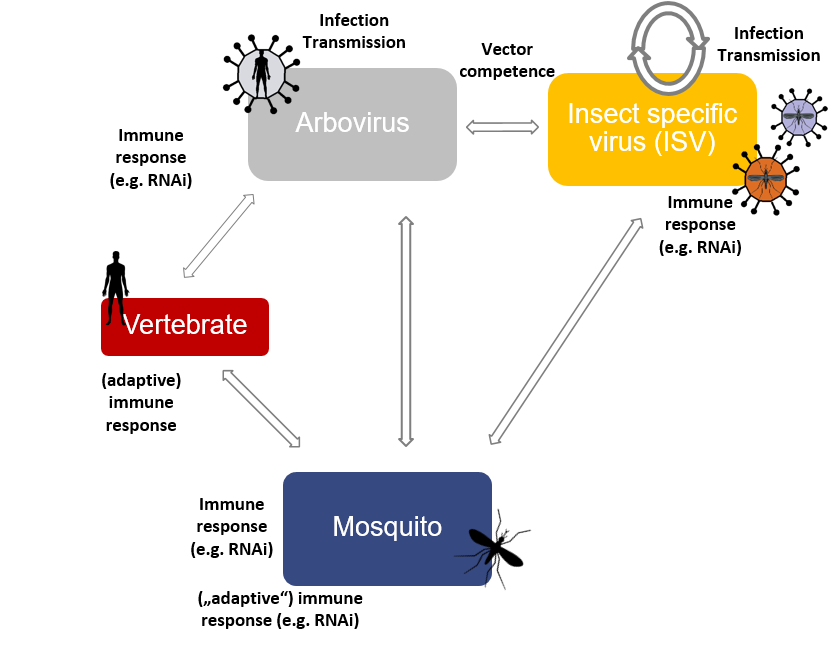Our research projects

Arthropod-borne viruses (Arboviruses) are transmitted by biting arthropods (e.g. mosquitoes, ticks and midges) to mammals (including humans) and can cause severe disease. Important arboviruses affecting humans and life stocks are the mosquito-borne Chikungunya virus, Dengue virus, Zika virus, Rift valley fever virus; the midge-borne Schmallenberg virus, Bluetongue virus and the tick-borne Crimean Congo haemorrhagic fever virus and tick borne Encephalitis virus.
Globalization and climate change have affected the spread of mosquito-borne viruses and the related risk of disease epidemics. Several mosquito-borne viruses (like Zika virus, Chikungunya virus, West Nile virus and Usutu virus) have been predicted to be able to cause unexpected outbreaks in different parts of the world, including Germany. For most of these viruses, no effective vaccine or antiviral drug is available. Therefore vector control is often the best possible option to reduce the disease burden. However, the need for novel antiviral substances, vaccines and vector control strategies against arboviruses is high as conventional vector control regularly fails due to insecticide resistance.
In addition to arboviruses, mosquitoes also host a lot of other microbes, including bacteria and mosquito-specific viruses (MSVs). Some of these microbes, have been suggested to affect the arbovirus infection and transmission in co-infected mosquitoes. Specifically the MSVs have been in the research focus over the last years as they offer to act as a novel vector control strategy. Besides, several MSVs are closely related to arboviruses and it is not yet clear why they are unable to infect vertebrates, like humans and animals.
The focus of my group is the study of the complex arbovirus-host-vector interactions, specifically the (molecular) mechanisms that control vector competence and the factors that affect arbovirus infection in vertebrates. This knowledge is used to develop new methods for vector control and thereby reduce the transmission of these viruses to humans and animals.


![[Translate to English:] Logo Zikalliance](/fileadmin/media/Allgemeines_und_Platzhalter/Logo/Logo_ZIKAlliance.jpg)
![Logo Deutsches Zentrum für Infektionsforschung (DZIF) [Translate to English:] Logo DZIF](/fileadmin/media/Das_Institut/Kooperationen/Logo_DZIF_01.png)
![[Translate to English:] Logo Daad](/fileadmin/media/Allgemeines_und_Platzhalter/Logo/Logo_DAAD.png)
![[Translate to English:] Logo Joachim Herz Stiftung](/fileadmin/media/Allgemeines_und_Platzhalter/Logo/Logo_Joachim_Herz_Stiftung.jpg)
![[Translate to English:] [Translate to English:] Logo DFG: Zu sehen ist der Schriftzu DFG in dicker blauer Schrift.](/fileadmin/media/Allgemeines_und_Platzhalter/Logo/Logo_DFG.png)
![[Translate to English:] [Translate to English:] Logo Bundesministerium für Ernährung und Landwirtschaft: zu sehen ist der schwarze Bundesadler, daneben ist die deutsche Flagge in einem dünnen Strich angedeutet (schwarz, rot Gold). Auf der rechten Seite steht in schwarz der Schriftzug Bundesministerium für Ernährung und Landwirtschaft.](/fileadmin/media/Forschung/forschungsgruppen/Population/Abteilung_Arbovirologie_und_Entomologie/AG_Virus_Metagenomik_und_Evolution/BMEL_Logo.svg.png)





